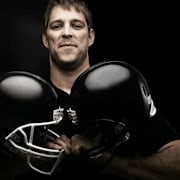Why Early Specialization Fails Athletes

In my discussion, Matt Reynolds, founder of Barbell Logic, shared valuable insights on the importance of General Physical Preparation (GPP) over early specialization for both athletes and military personnel. Reynolds, a respected coach and former elite powerlifter, highlighted a common issue across sports, military training, and even popular fitness programs: the rush to focus on specialized skills too early, often at the expense of well-rounded physical fitness.
Parents often push their children toward early specialization, encouraging them to excel in one sport from a young age. However, this strategy can lead to burnout, injury, and a lack of adaptability in the long term. Reynolds shared an example from his work with Jordan Gross, a former All-Pro offensive lineman for the Carolina Panthers. Gross, a strong advocate for GPP, sees firsthand how early specialization limits an athlete’s overall development. The constant focus on a single sport leaves young athletes lacking the general strength, agility, and endurance they need.
This issue isn’t limited to youth sports. Early specialization is also seen in military training, where recruits may focus too heavily on specific skills, like running long distances, without developing a broader foundation of physical fitness. As Reynolds noted, “We said what we need you to do is run. When do you run now in 2023, 2024? You’re not running 30 miles. That’s not a combat scenario.” The narrow focus on long-distance running does not prepare soldiers for the demands of combat, which require strength, endurance, agility, and the ability to carry heavy loads.
GPP focuses on building a well-rounded foundation of fitness, covering strength, agility, endurance, and flexibility. This foundational training prepares the body for various demands and reduces the risk of injury. Athletes and soldiers alike need to develop a strong base before advancing into sport-specific preparation (SPP) or specialized combat training. Reynolds explained that GPP “looks like lifting weights and running and the things you do within the confines of the gym,” providing a balanced fitness level that can be adapted for more specific skills later on.
This concept of general preparation aligns with the fundamentals of strength and conditioning. Athletes, soldiers, and even fitness enthusiasts benefit from GPP because it builds the body’s capacity to handle multiple physical demands.
Reynolds also shared his thoughts on the influence of CrossFit, particularly the idea of GPP as a standalone “sport.” CrossFit founder Greg Glassman famously marketed CrossFit as the “sport of general physical preparedness,” creating a competitive model around what was intended to be a foundation for broader fitness. “The minute you start talking about sport, now you’re moving down this ladder towards sport-specific preparation,” Reynolds explained. By treating GPP as a competitive sport, the focus shifts away from the true intent of building a versatile fitness foundation, turning it into something overly specialized.
For both athletes and military personnel, a balanced approach to fitness can provide lifelong benefits. Reynolds emphasized the need to move through GPP into SPP rather than skipping foundational training. This balance prevents burnout, promotes injury resilience, and creates more adaptable individuals ready for various physical challenges.
1. Focus on GPP Early: For young athletes, military personnel, and general fitness enthusiasts, build a foundation through GPP before moving into sport-specific training.
2. Avoid Specialization Too Soon: Don’t rush into specialized skills. Developing all-around fitness creates a more adaptable body, better prepared to take on specific demands.
3. Use GPP as a Foundation, Not a Sport: Treat GPP as a base for more advanced training, rather than a competition in itself. This prevents over-specialization and keeps the focus on balanced fitness.
Emphasizing a solid GPP foundation over early specialization fosters adaptability, longevity, and resilience, allowing individuals to perform at their best when it truly counts.
